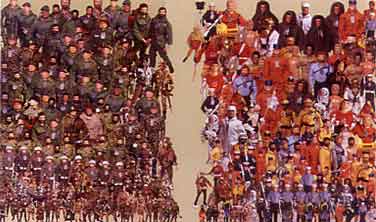
Nicole Eisenman © 2000
Them Vs. Them
Nicole Eisenmanby Donald Goddard |
| The gallery space when you walk in the door is cluttered with relentlessly critical objects. Cultural absurdities on either side: on the right wall cutouts of variously uniformed "G.I.Joes" collaged to a board in two phalanxes called Them Vs. Them, on the left wall an informal grid of pages torn out of magazines using art, art situations, artiness, art (celebrities?) as aids to selling products. Blunt expositions of war and art, maybe too blunt, or maybe art makes such bluntness allowable? People want Nicole Eisenman's work to be funny. But that is, often, all they want. |  Nicole Eisenman © 2000 Them Vs. Them |
| Anyway, they are jokes, right? An avalanche of jokes follows, most of them combining collage and Eisenman's defiantly direct drawings of figures, among them Ass Rash: The Great Equalizer, The Worst Road-Trip, and, finally, a series of about-to-crash racecars labeled with the names of anti-depressants. Opposite is Big Nick's Soho Tee Shirt Canteen, a makeshift booth in which are displayed a jumble of second-hand clothes and knick-knacks. Culture in disguise, hiding intelligence. Everything has a (very low) value; everything is for sale. At the back of the canteen, half-covered, is a painting by Eisenman, like an ignorable flea-market painting, that is related to a piece on the facing wall called Mummy and Innerchild. It is a story to be unwrapped, a hidden death. The motives are ancient, and the alternative name for the canteen, written on its far side, is "Permanent Jewish Art Exhibition." |
Nicole Eisenman © 2000 |
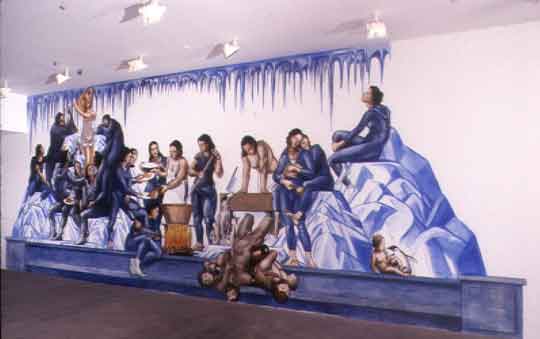 Nicole Eisenman © 2000 Sloppy Joe Party |
| Then the ambience changes. Death is no longer hidden, but simply transformed. From the clutter of information, slapstick, and obfuscation at the entrance, something like that of the makeshift and mundanely mysterious propagandizing of a church narthex, one passes immediately into the clean, open space of the main gallery, and the mythology begins, one that we must accept at face value, without question, as we accept those grand stained-glass and fresco cycles of the European Middle Ages and Renaissance, being wedded to their time, as they are, and our desires for their time. Eisenman creates scenes of a new society, a new world in which women hunt and feast on the abject bodies of men. The men are dejected and unknowing, half asleep in this cold, seemingly barren world of which they know nothing. | 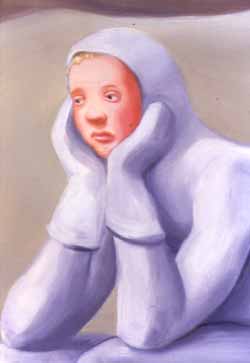 Nicole Eisenman © 2000 Fishing (Detail) |
| Their
bewildered bravado has finally trapped them. There are no buildings, cultivated
lands, or signs of civilization, only landscapes of ice--arctic vastnesses in
which women rule. The crucial event, wherein a group of women roast and ingest
the flesh of three men, still visible as identical bearded, trussed, and truncated
figures, is depicted in a 12-by-30-foot mural called Sloppy Joe Party, drawn
directly on one wall. Opposite are two benches from which the spectator, at ease,
may contemplate the central power and truth of this vision. And on the wall next
to the benches is the single, rather small Portrait of G.I. Joe, the ennobled
victim in his succulent, artless youth. Throughout, in this youth and most of
the women, reigns an irrevocable melancholy. |
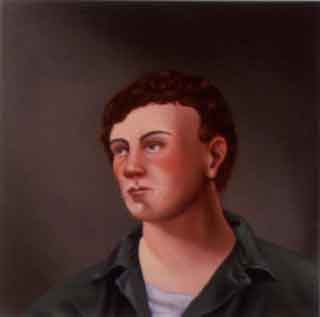 Nicole Eisenman © 2000 Portrait of a G.I. |
| In the final room, the drama is played out in a kind of modest triumph, an assumed triumph, as though history had worked out this way. Details of the mythology are presented as they might be in a gallery of a great city museum. Naked figures of reclining women are on fire, directly touched--their passion given universal legitimacy and power--by the sun, in Ozone Beach and Haunted Ocean. Flocks of men, residue of the G.I.s in Them Vs. Them, are orgasmically contained and feministically shrouded in Man Cloud and Bat Cave. All these paintings represent the classical statement of the triumph. On the end wall are two magical Düreresque portraits, Big Green Head #1 and Big Green Head #2, which cast women as the late medieval-early Renaissance progenitors of our modern world. The figures are dark and meld with the stars and sea, improvements on the G.I. in the previous room, but perhaps essentially the same. |
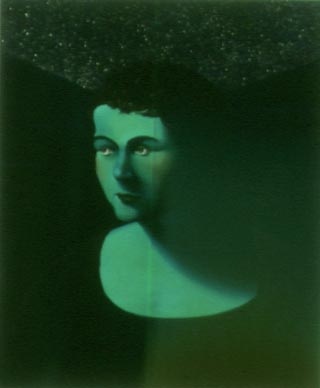 Nicole Eisenman © 2000 Big Green Head #2 |
|
It seems strange, as it does with most meaningful art, that the pieces are separately priced and will one day be scattered to the winds. -- Donald Goddard © 2000
|
Art Review - NYArtWorld.com - NYAW.com. All artwork is copyright of the respective owner or artist. All other material © Copyright 2015 New York Art World ®. All Rights Reserved.
New York Art World ® - Back to Top